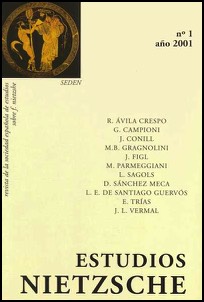La risa y el ‘consuelo intramundano’: El arte de trascenderse y superarse en Nietzsche
DOI:
https://doi.org/10.24310/EstudiosNIETen.vi1.8845Keywords:
risa, arte, DionisoAbstract
Todo el mundo no nace como Zaratustra riendo; todo el mundo no nace como Dioniso danzando; todo el mundo no sabe ver como Heráclito que el mundo es un juego divino. W Kauffman llegó a decir que «para Nietzsche la risa representa una actitud hacia el mundo, hacia la vida y hacia uno mismo» Este artículo analiza como Nietzsche vuelve a rescatar la ‘risa homérica’ que Platón había expulsado aparentemente de su sistema en el Fedón, pues sólo este reír puede detener el nihilismo, en cuanto poder cuasi-trascendental de la transvaloración de los valores.
Downloads
Metrics
References
Alderman, Harold, Nietzsche’s Gift. Ohio: Ohio University Press, 1977.
Berger, J., La risa redentora. Madrid: Kayros, 1999.
Berger, Peter, Risa redentora. Barcelona: Kairós, Barcelona, 1998.
Cacciari, M., Desde Nietzsche. Tiempo, arte, política, tr. M. Cragnolini. Buenos Aires: Biblos, 1994.
Cacciari, M., Geo-Filosofíade Europa tr. de Diego Sánchez Meca, Madrid: Alderabán, 2000, p. 94.
Cragnolini y G. Kaminsky, Nietzshe actual e inactual. Vl. 2. Oficina de Publicaciones del C.B.C., Buenos Aires, 1996.
Cragnolini, M., “De la risa disolvente a la risa constructiva: una indagación nietzscheana”, en M. Cragnolini y
Gregorio Kaminsky (eds.), Nietzsche actual e inactual, vol 2, Buenos Aires: Universidad de Buenos Aires,1996, pp. 99-124.
John Lippit, “Nietzsche, Zaratustra and the Status of Laughter”, en Britisch Journal of Aesthetics, 32 (1992), pp. 39-49.
Kauffman, W., The Basic Writings of Nietzsche. Modern Library, New York, 1968.
Kessler, M., L’esthétique de Nietzsche, PUF, París, 1998.
Klossowski, P., Tan funesto deseo. Madrid: Taurus, 1980.
Kundera, Milan, El libro de la risa y el olvido. Barcelona: Seix Barral, 1978.
Nietzsche, F., Sämtliche Werke. Kritische Studienausgabe, ed. G. Colli y M.Montinari, XI vol., Berlin-New York / München: W. de Gruytrer, 1980.
Nietzsche, F., El nacimiento de la tragedia, trad. Sánchez Pascual Madrid: Alianza, 2000.
Nietzsche, F., Humano, demasiado humano, trad. Sánchez Pascual Madrid: Alianza, 1981.
Nietzsche, F., La gaya ciencia, trad. Sánchez Pascual Madrid: Alianza, 1977.
Nietzsche, F., Así habló Zaratustra, trad. Sánchez Pascual Madrid: Alianza, 1971.
Nietzsche, F., Más allá del bien y del mal, trad. Sánchez Pascual Madrid: Alianza, 1984.
Nietzsche, F., El caso Wagner, trad. Sánchez Pascual Madrid: Alianza, 1992.
Pftotenhauer, H., Die Kunst als Physiologie. Nietzsche ästhetische Theorie und literarische Production, Stuttgart,: Metzler,1985.
Philonenko, A., Nietzsche. Le rir et le tragique. Paris: LGF, 1995.
Quesada, Julio El nihilimso activo. Genealogia de la modernidad. Guadalajara (México):Universidad de Guadalajara, 1999.
Sochjer, Jaques, La question et le sens.Esthétique de Nietzsche. Paris: Aubier, 1972.
Ulrich Satlow, A., Die Bedeutung des Lachen und Tanzens in Nietzsches Zaratustra. Diss., Leipzig, 1950.
Vattimo, G., El sujeto y la máscara. Barcelona: Península, Barcelona,1989.
Downloads
Published
How to Cite
Issue
Section
License
As of issue 21 (2021) this journal is published only in open access (diamond route).
From that number 21, like the previous numbers published in NIETZSCHE STUDIES, they are subject to the Creative Commons Acknowledgment-NoComercia-ShareIgual 4.0 license, the full text of which can be consulted at <http://creativecommons.org/licenses/by-nc-sa/4.0 >
It is the responsibility of the authors to obtain the necessary permissions of the images that are subject to copyright.
This work is licensed under a Creative Commons Attribution-NonCommercial-ShareAlike 4.0 International License.
Copyright generates two different rights: moral rights and patrimonial rights that EJFB recognizes and respects. Moral rights are those relating to the recognition of the authorship. They are rights of a personal nature that are perpetual, inalienable, unseizable and imprescriptible as consequence of the indivisible union of the author and his/her work.
Patrimonial rights are those that can be derived from the reproduction, distribution, adaptation or communication of the work, among others.







11.png)
